Whether you’re looking to start your own hosting business or add web hosting as a service offering to your existing agency’s clients, there are several providers that let you white-label their services and resell them to others. After examining the available options, we consider A2 Hosting to be the best reseller hosting for most people, because of the features and performance you get for the price.
The Best Reseller Hosting Plan for Most
A2 Hosting
Best for Most
One of the most well-rounded reseller providers out there, A2 Hosting delivers the features that matter and reliable hosting performance at a good price. Plus, your reseller business will be backed by A2's rock-solid support.
The best reseller hosting doesn’t make you cut corners to start offering web hosting to your clients. That’s why the well-rounded plans from A2 Hosting are our top pick.
You get the fullest feature set of any provider on our list—they’re one of the few providers we’ve found that includes both automated backups and domain reselling for free on every plan—at a very palatable price. Plus, your clients’ sites will benefit from the reliable performance of A2’s hosting servers.
The 5 Best Reseller Hosting Options to Consider
- A2 Hosting – Best for most
- InMotion Hosting – Most scalable reseller hosting
- HostGator – Best for hosting and domain reselling
- SiteGround – Best for agencies that build websites for clients
- Nexcess – Best for offering clients premium web hosting
When It Makes Sense To Invest in a Reseller Hosting Plan
Are you an agency owner looking to offer hosting as part of your current suite of services? Or maybe you’re just an entrepreneur who wants to white-label another provider in order to start your own hosting side hustle.
For anyone looking to sell web hosting (plus domains and email accounts) to others, reseller hosting is your ticket to a new stream of revenue.
Reseller hosting is usually shared hosting (though it can sometimes use cloud infrastructure or more robust server configurations) with plans that come enhanced with key tools for client management and billing, plus features for securing and selling domain names and email to the clients whose sites you’re hosting.
If you’re looking to just host a few websites of your own or only work on a couple websites for a single client or two at a time, you can likely get away with a multi-site plan on vanilla shared hosting.
But, if you’re serious about leveraging this opportunity to really drive your revenue upward and grow your client base, reseller hosting plans can kick your business into another gear entirely.
#1 – A2 Hosting — Best for Most
A2 Hosting
Best for Most
One of the most well-rounded reseller providers out there, A2 Hosting delivers the features that matter and reliable hosting performance at a good price. Plus, your reseller business will be backed by A2's rock-solid support.
When it comes to offering your clients a quality hosting experience, A2 Hosting checks all our boxes.
The depth of reseller-oriented features is fantastic, really separating A2 from the rest of the pack.
Blesta, the automated billing software built into the platform, makes invoicing clients a breeze. It’s an incredibly easy platform to use and customizable enough to tailor it to the way you do business.
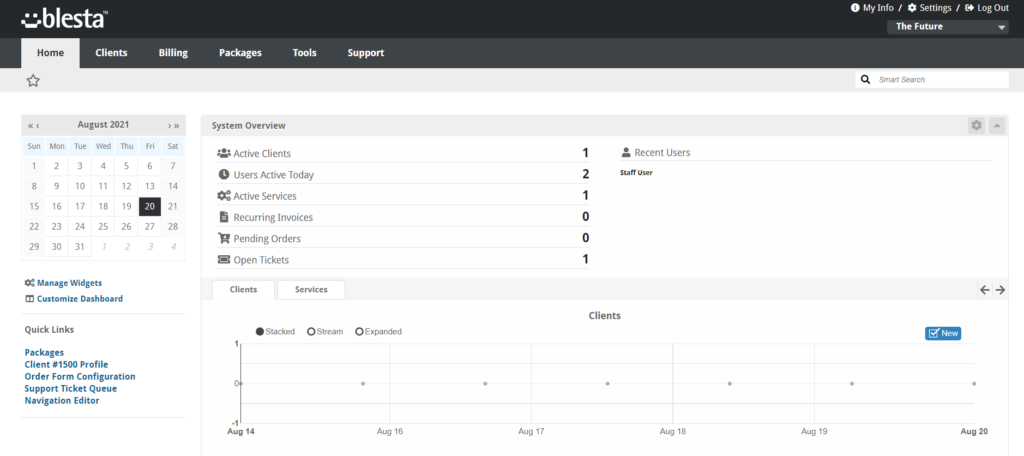
You’ll be able to manage your clients and the services they’re using, set up automated invoicing, and check any support tickets that have been submitted. Plus, you get some handy day-to-day analytics in the usage graph at the bottom of the Blesta dashboard.
The client-facing portal is even more well-designed, giving them a location to easily pay their bills, manage payment methods, adjust settings to their hosting and domain services, and get in touch with you.
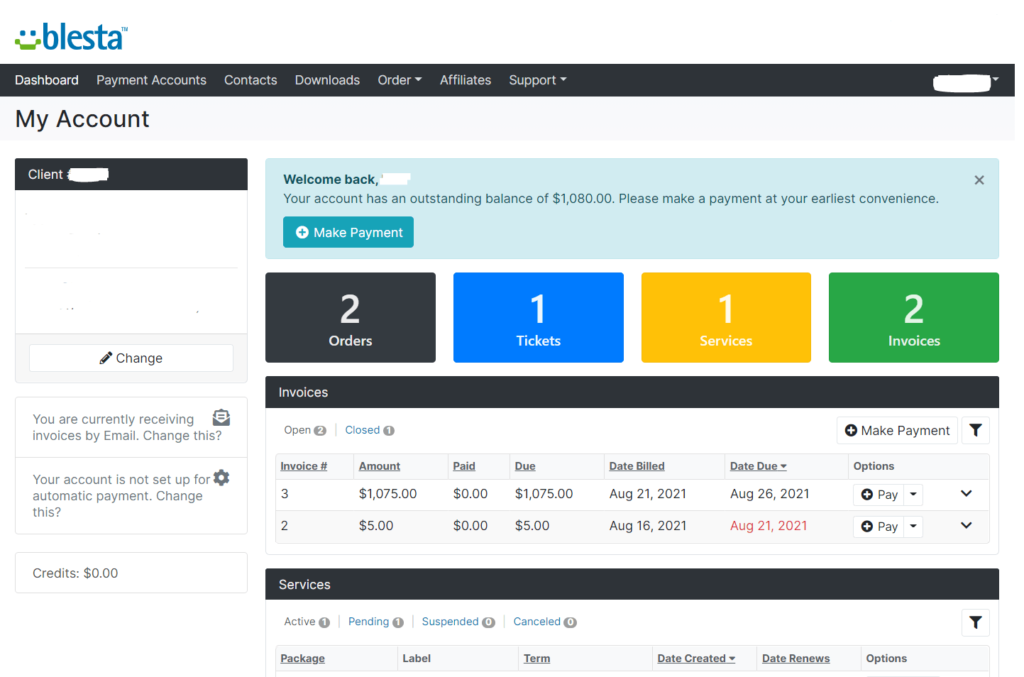
There’s a lot more you can do with Blesta, especially if you extend its functionality through add-ons for tasks like automated site data backups and multi-invoice organization.
On the site and hosting administration side of things, A2 Hosting uses WHM and cPanel. This is where you’ll create the hosting plans to resell to clients and add new cPanel accounts for them. You can even resell domain names and domain registration privacy to clients, as well.
You can customize cPanel to match your agency’s branding by finding the Customization option on the left-hand sidebar menu. Set your company name and logo and add useful links for clients, among other elements you can tweak.
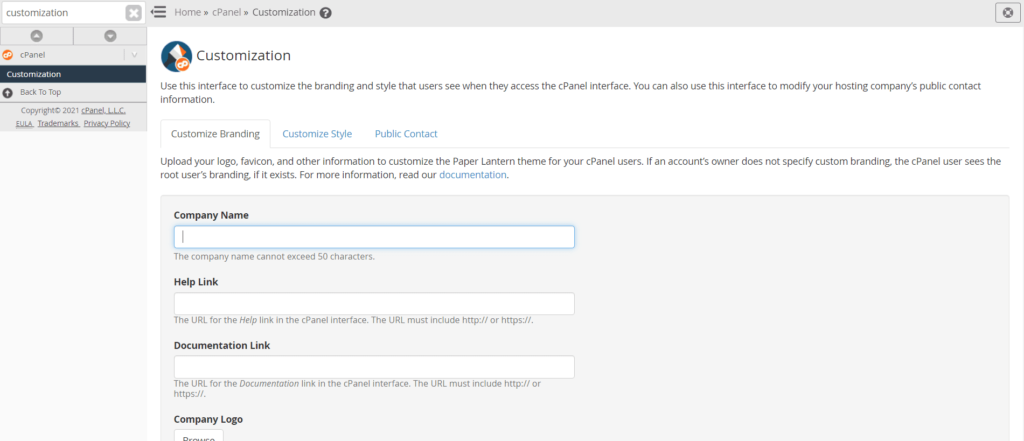
Softaculous is included as well, allowing your clients to add and install over 400 apps, including WordPress and ecommerce modules, with just a few clicks. And within their control panel, clients can access email, DNS settings, and SSL security for easy self-management.
On top of that, A2 Hosting is one of only three providers on our list that offers automated site backups for free. Weekday backups are stored for seven days, while backups done on Sundays are held for a full 30 days.
You or your customers can go into cPanel > Server Rewind to see all your site data backups and restore a previous site version at any time.
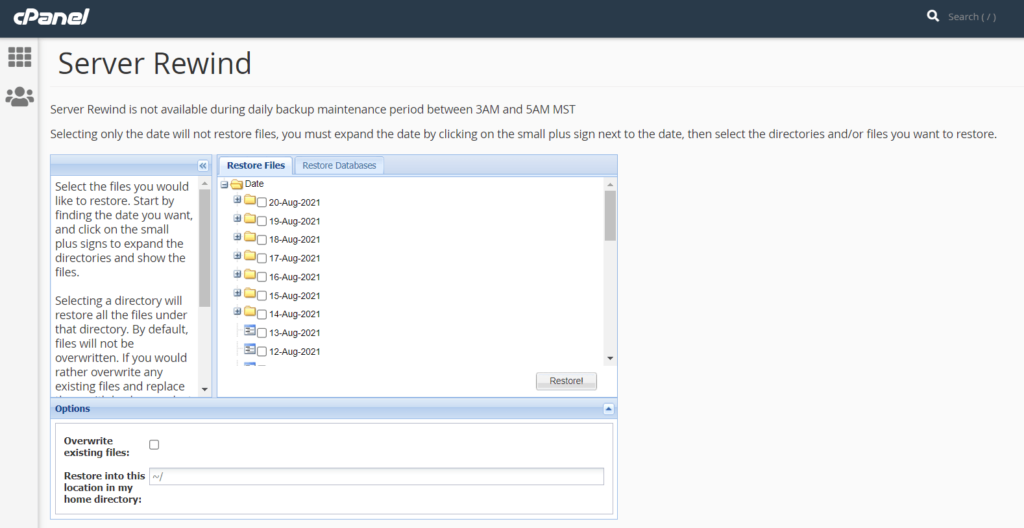
It’s very easy to use. All you have to do is select the date and click Restore.
These features give you a full-fledged reseller hosting plan. A2 Hosting has done the best job giving you access to them with no extra fees included, something no other provider on the list can claim.
But it’s not just the administrative features that make A2’s reseller hosting shine. You’re getting reliable performance that you can, in turn, promise to your clients. Our test sites on A2 Hosting stayed up and available for all but two minutes for the entire month, resulting in a 99.995% uptime rate.
All of this comes at a lower price than you might expect.
Basic reseller plans start at $17.99 per month on a one-year or three-year contract. That entry-level plan, Kickstart, provides you with 60 GB of storage and room for up to 30 client accounts.
That might be a little low on the storage space for some, so A2 offers three other basic reseller plans that scale all the way up to 3.5 TB of storage and up to 130 client accounts. Each successive plan also provides more bandwidth.
If you really want to deliver the best hosting to your clients, you can instead opt for the Turbo versions of A2 Hosting’s reseller plans. These give you access to uniquely optimized servers that can deliver up to 20 times faster load times, which in turn helps the sites your clients have hosted on your account perform better in terms of SEO and conversions.
Turbo Kickstart’s pricing starts at $22.99 per month for a 12-month or 36-month commitment.
And the upper-echelon plans aren’t unreasonable, either. The vanilla version of the Scale plan starts at $39.99 per month while Turbo Scale’s pricing can be as low as $49.99 per month.
What’s best for you and your clients, though, is that A2’s renewal rates are some of the most palatable in this category of hosting. Once that promotional pricing goes away (whether it’s after year one or year three) on Kickstart, for example, the monthly rate rises to $34.99. While an almost 100% increase month can seem a bit steep, it’s actually far lower than the post-promotional rate hikes you’ll see from others on this list.
That allows you to charge a reasonable price to your clients and keep it there, preventing them from getting a bad surprise 13 months or so into their relationship with you.
In brief, A2 Hosting is an excellent reseller hosting provider that gives you an incredible feature set with serious scalability at a more than fair price.
#2 – InMotion Hosting — Most Scalable Reseller Hosting
InMotion Hosting
Most Scalable
Start on a basic reseller plan from InMotion Hosting and you’ll be able to grow your business and client base to your heart’s content. Get some of the best resource allotments in reseller hosting at great promotional rates and scale up as needed.
With InMotion Hosting, the sky’s the limit. Many of their hosting options provide a lot of room for sites to grow, and their reseller hosting plans are no exception.
That’s a huge benefit when you’re reselling hosting to others—as you continue to grow your client base, you’ll be able to belly up to better plans to handle new and more demanding customers.
Even InMotion’s entry-level plan is robust. It delivers 80 GB of SSD storage, 1 TB of allotted bandwidth, unlimited email accounts, and 25 client accounts. In terms of storage space and bandwidth, that’s more than you’ll see on anyone else’s entry-level reseller plans. And you can secure it for just $15.99 per month if you commit to a three-year term at checkout.
Just imagine, with five clients you could charge as little as $4 per month and still make a bit of money. Everyone gets up to 16 GB of the disk space and 200 GB of monthly bandwidth, which is incredibly generous at that price.
But it gets so much better on successive plans.
For just $9 more per month, you can double that storage space (plus unlock access to faster NVMe drives), bandwidth allotment, and number of client accounts, plus unlock an extra dedicated IP address and phone-based support from InMotion.
Running that same quick math, that means you could charge those same five clients $5 per month for 32 GB of storage space and 400 GB of monthly bandwidth. Or, provide the same resource allocations as the base plan and add five more clients without having to raise your price.
InMotion Hosting plans scale all the way up to 300 GB of NVMe SSD storage, unlimited bandwidth, 100 client accounts, and five dedicated IP addresses for around $50 per month.
Alongside this scalability comes just about every feature you’ll need as a hosting reseller.
InMotion gives you free access to billing software in the form of WHMCS. All you need to do is go into your account dashboard and request a software license. You should see it right with the other options for going to cPanel, managing email accounts, and so on.
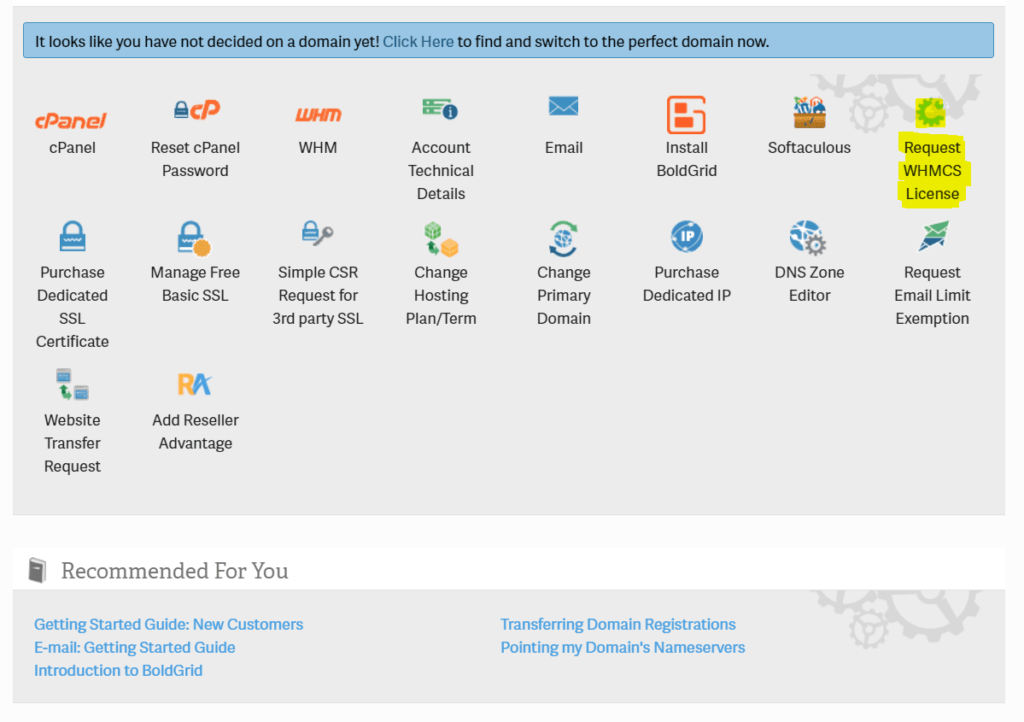
After you review a few details on your WHMCS license, click Proceed and an email will be sent to you within a few minutes, containing your license information. After that, you can install WHMCS via Softaculous.
You can manually add cPanel accounts in WHMCS, then create client hosting plans with the features and resource limits you want. You’re able to see the number of accounts you have (compared to your InMotion plan’s allotment) and a complete overview of your resources for bandwidth and disk space.
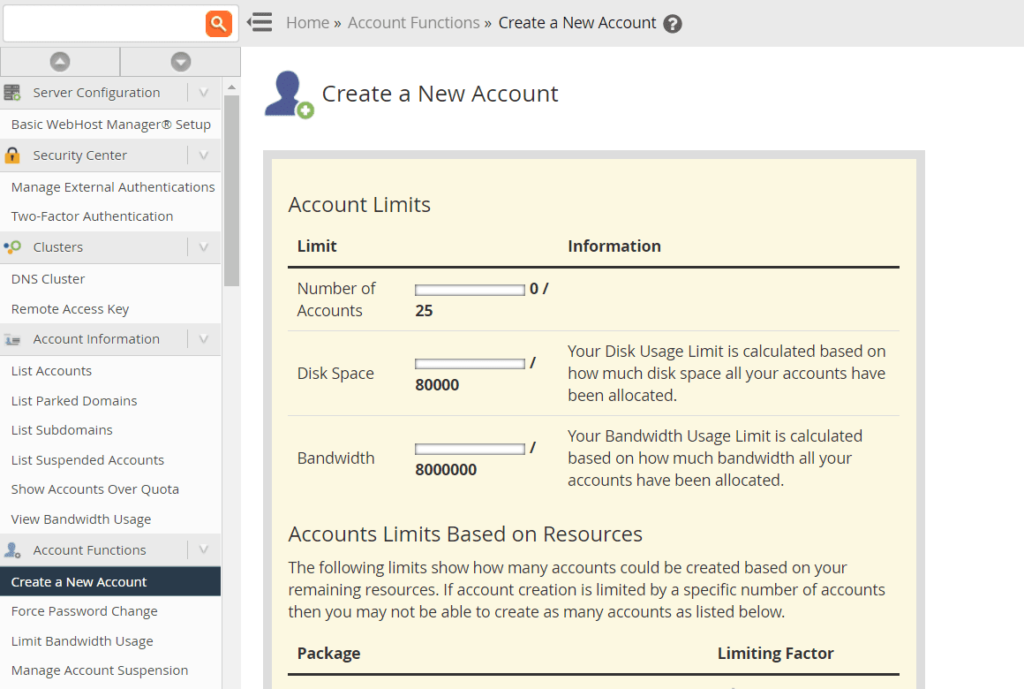
Another big plus of InMotion Hosting is the ability to resell domain names alongside its hosting. Much like accessing WHMCS, you can find a link inside your account dashboard for Enom, a domain name reselling platform with more than 550 top level domain extensions available.
Not only can you sell custom domains to your clients via Enom, but you can also offer SSL certificates and hosted email. It even gives you the ability to offer domain name privacy and protection, but it will cost you $4.95 per domain per year (which means you may need to charge clients a bit more to provide it to them).
Create a free Enom account using the link in your dashboard. It’s not labeled as Enom, so look for the lowercase “e” logo and click on Domain Reseller Account.
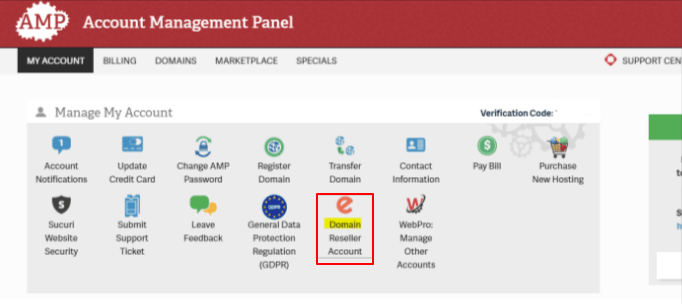
The only thing really missing here is automated backups. While not included for free, you can tap into InMotion’s paid add-on—costing $2 per month for the first 10 GB of backup data and an extra $1 for each 10 GB beyond that—to enable this.
If you don’t want to inflate your budget any further, you can use a WordPress plugin to accomplish the same thing.
If you want a solid foundation for reselling web hosting that can scale as your client base grows, get started with InMotion Hosting today.
#3 – HostGator — Best for Hosting and Domain Reselling
HostGator
Best for Domain Reselling
Why stop at reselling hosting? With HostGator, you get two avenues to selling domains to your customers, in addition to the ability to resell their quality web hosting. Expand your revenue streams by tapping into this provider’s partnership with ResellerClub and Enom.
HostGator is all about balance. It’s not the cheapest, but its plans are priced right around average (especially in terms of renewal rates). It’s not the most powerful, but our month of testing showed that their servers delivered 100% uptime and kept load times well below one second.
In essence, HostGator is just a solid, well-rounded option for reseller hosting. Yet, they begin to stand apart from the crowd when you dig just a bit deeper.
A lot of providers of reseller hosting allow you to extend a few typical hosting add-ons to your clients, like email hosting, domain names, and SSL certificates. But HostGator gives you more ways to procure and resell domains to your clients by including a ResellerClub account with your reseller plan.

That opens up a whole new world of reselling options for your company. HostGator’s reseller hosting plans are better for simpler sites, especially one-pagers, because of the generally low storage space allocation for the price.
But you can use that to your advantage—such as building and hosting landing pages for clients and securing unique, effective domains for each, for example. That way, you never have to worry about hitting resource limits, plus you can charge more for the convenience of offering a site build, hosting, and a domain in one package.
Or, with this free access to ResellerClub, you could even focus more on reselling domains than the hosting itself.
You can also use Enom for domain reselling, which you can access via your HostGator reseller account.
Enom’s prices are slightly higher than ResellerClub for common extensions. For example, a typical .com domain tends to cost around $11.99 from ResellerClub, but $14.99 from Enom.
However, you get superlative support from Enom. You can schedule calls to help with registering domains individually or in bulk and tap into their first-class customer service, knowledge, and availability.
Whichever way you use HostGator and its domain reseller partners, you can manage it all (and your clients) in WHMCS.
To enable this, just request your free license key via HostGator’s dedicated link after you’ve completed the checkout and account creation process.
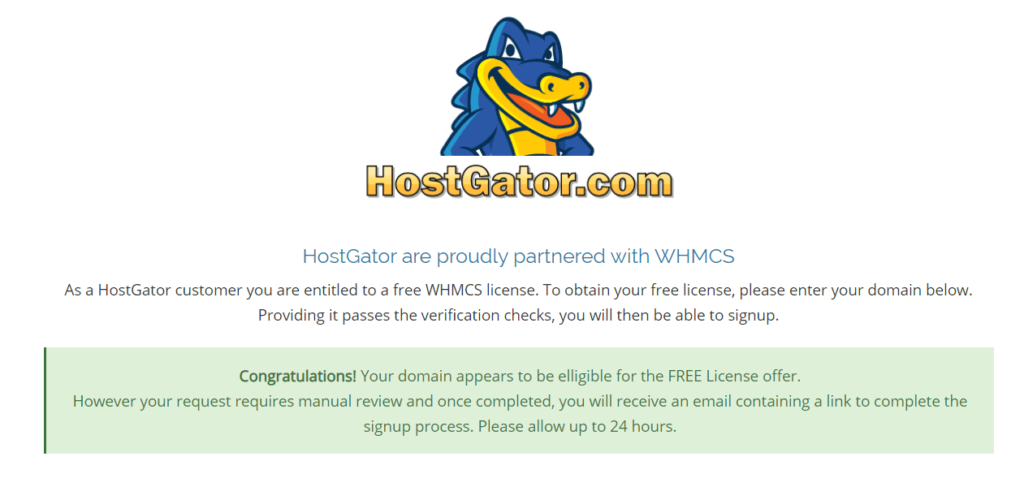
After that, you’ll get a basic walkthrough of WHMCS upon sign-in, which guides you through configuring basic settings, setting up payment methods, enabling domain functionality, connecting your web hosting packages, and setting up other add-ons and services.
From there, you can white-label your dashboard so it matches your branding, then create new client accounts, edit their settings and packages, and get them set up with hosting, domains, and email accounts.

We mentioned HostGator didn’t exactly blow us away in terms of price, but it’s still a solid deal if you can leverage the easy reselling of domains and more on their plans.
Reseller hosting from HostGator starts at $19.95 per month on a three-year commitment. That plan gives you 60 GB of storage space, 600 GB of monthly bandwidth, and unlimited websites. If you need more, plans scale up to an intro rate of $24.95 per month for 140 GB of storage and 1.4 TB of bandwidth.
All plans come with WHMCS for client management and billing, plus access to ResellerClub and Enom for domain reselling.
Expand your ambitions beyond reselling web hosting and unlock new revenue streams with HostGator’s reseller hosting.
#4 – SiteGround — Best for Agencies That Build Sites for Clients
SiteGround
Best for Site-Building Agencies
Add hosting to your suite of design and site-building services for clients. SiteGround is easy on your wallet and delivers some of the best uptime and speed around, so you can rest assured your clients will appreciate the value of the web hosting they get from you.
SiteGround is somewhat unique on this list. It isn’t as suitable for just reselling hosting on its own, as it doesn’t come with automated billing software. But it’s the best option for adding web hosting services to agencies that already offer website creation or other digital branding or marketing services.
If you already bill for design work, site builds, or web development, you can leverage SiteGround’s affordable reseller hosting without its lack of built-in billing and client management being a detriment.
And you’ll still benefit from the agency-appropriate bonus features from SiteGround, like easy staging and cloning.
Let’s start with one of SiteGround’s most appealing virtues: the price. Whereas so many other providers charge $15 or $20 per month for their most basic reseller hosting plans, SiteGround includes reseller features on its two higher-end shared hosting plans without changing the price point.
The result is that you can secure web hosting for your clients for as little as $4.99 per month.
That’s an incredible deal, but it’s a bit low on the storage allotment with only 20 GB to share among any client sites you host on it. You can step up to GoGeek for $7.99 per month to double that storage space or opt for the pricey but custom-built allocations of SiteGround’s Cloud plan ($100 per month).
After your first year, SiteGround’s renewal rates jump up to a more typical rate for reseller hosting. The entry-level option rises to $24.99 per month, while GoGeek jumps up to $39.99. That’s a steep rise in rates, but in line with just about every other provider (we’ve noticed a rough average of $35 per month upon renewal of entry-level reseller plans).
And, for that reasonable price, you’re getting some of the better performance we saw during our testing period. Our test site on SiteGround’s GoGeek plan never experienced any downtime and kept load times near a quarter of a second (266 milliseconds, to be exact).
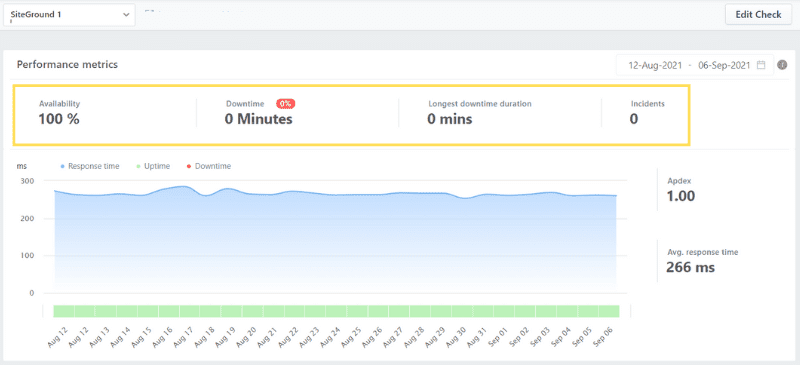
Beyond capable performance at a great initial price, you get some key tools that can help your agency cater to clients’ needs.
SiteGround’s reseller plans allow you to bring collaborators into your account, making it easy for your in-house designers, coders, and client account specialists to work together on builds. Plus, you can even bring client representatives into the platform to join you for site management, testing, updates, and troubleshooting.
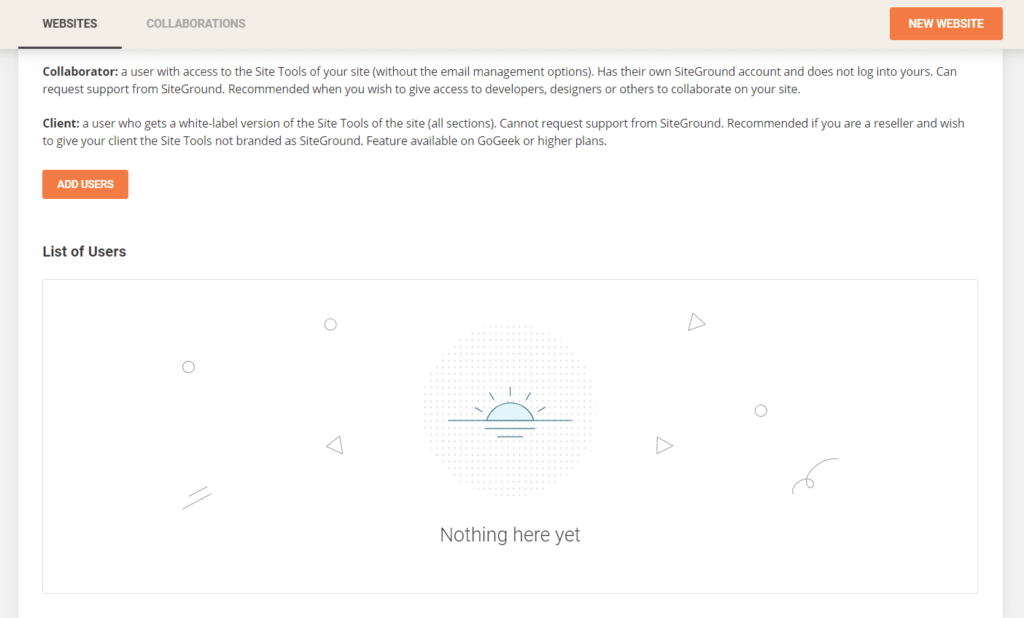
SiteGround uses their Site Tools platform in place of cPanel for administration. From there, you can install applications, manage your email accounts, check stats, set up security features, and everything else you would usually take care of in cPanel.
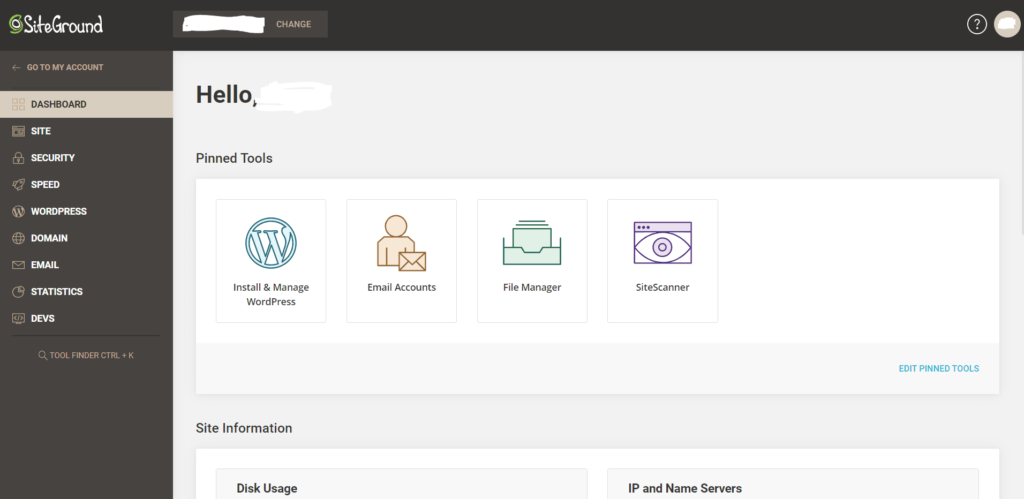
You’ll find SiteGround’s automated daily site backups under the Security tab on the sidebar. Each one is stored for 30 days, so you’ll always have restore points going back a full month if you or your clients need to revert changes at any time.
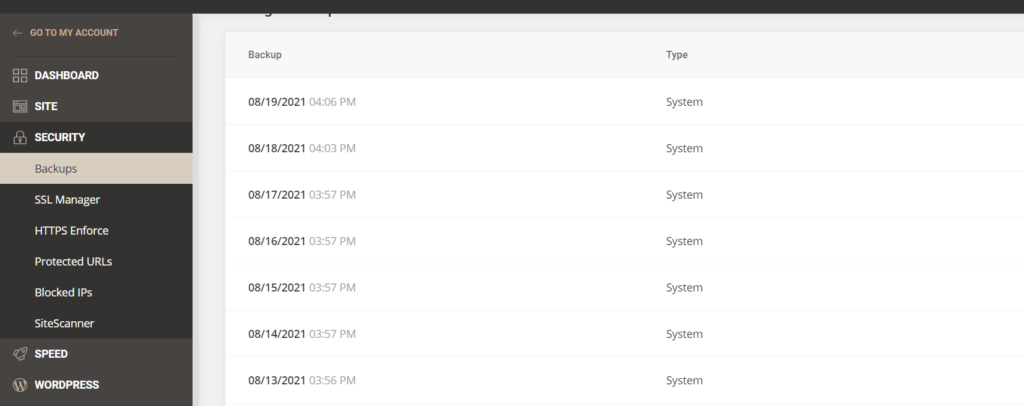
If you open up a backup, you have the option to restore all files and databases, restore just one or the other, or restore emails.
None of your storage limit is used for these backups either, as they are stored on a remote server. That helps mitigate the low storage thresholds on SiteGround’s two shared reseller plans.
Add SiteGround’s sterling customer support to their suite of benefits and this provider becomes an even more appealing choice to site-building and digital branding agencies.
If you’re a part of a firm that has already secured a client billing platform and want to expand your service offerings, SiteGround is a smart—and affordable—choice.
#5 – Nexcess – Best for Reselling Premium Hosting
Nexcess
Best for Premium Reseller Hosting
If you’re an agency that want to deliver the best hosting experience to clients instead of half-hearted shared hosting plans, Nexcess is your best bet. While pricier than others on this list, you gain performance, support, and managed features no other provider can touch.
Nexcess is in an entirely different class of reseller hosting. Instead of reskinning typical hosting plans for reselling, they offer a one-of-a-kind web hosting offering that’s been built with agencies in mind.
Admittedly, that makes this an expensive option. But, if you want to deliver impeccable hosting quality and service to your clientele, no other option on this list can touch Nexcess. Give clients a high-end hosting experience rather than squeezing the most you can out of restrictive low-cost plans.
Nexcess’ web hosting for agencies is custom-built based on the site platform your clients’ websites use, whether that’s standard WordPress, WooCommerce, or Magento.
You can manage as many clients as you need to on one plan for somewhere between $100 and $700 per month. Yet, you’ll never have to worry about their hosting experience degrading because you’ve added more clients. Nexcess allows any agency plan to autoscale resources as needed, while a powerful CDN that leverages edge computing technology keeps load times microscopic.
Just look at the results of our speed and uptime test. Our demo site averaged load times of nearly one-tenth of a second for an entire month.
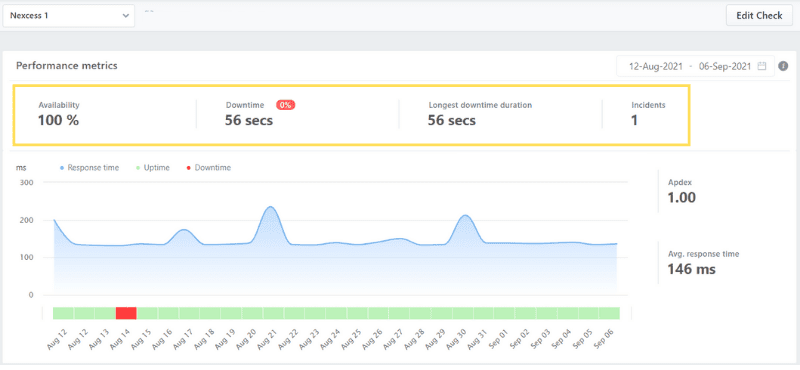
Plus, as you might expect, Nexcess is also incredibly friendly to developers. You get to manage code, versions, and deployments your way, without having to fit your goals within the constraints of a cookie-cutter backend. You can do anything from host a hundred client websites to run PHP-based applications.
A great feature for agencies is the level of guest and collaborator access control you have. Create accounts with custom-defined permissions or use any of the several pre-built roles to bring your team, clients, partners, contractors, and stakeholders on board.
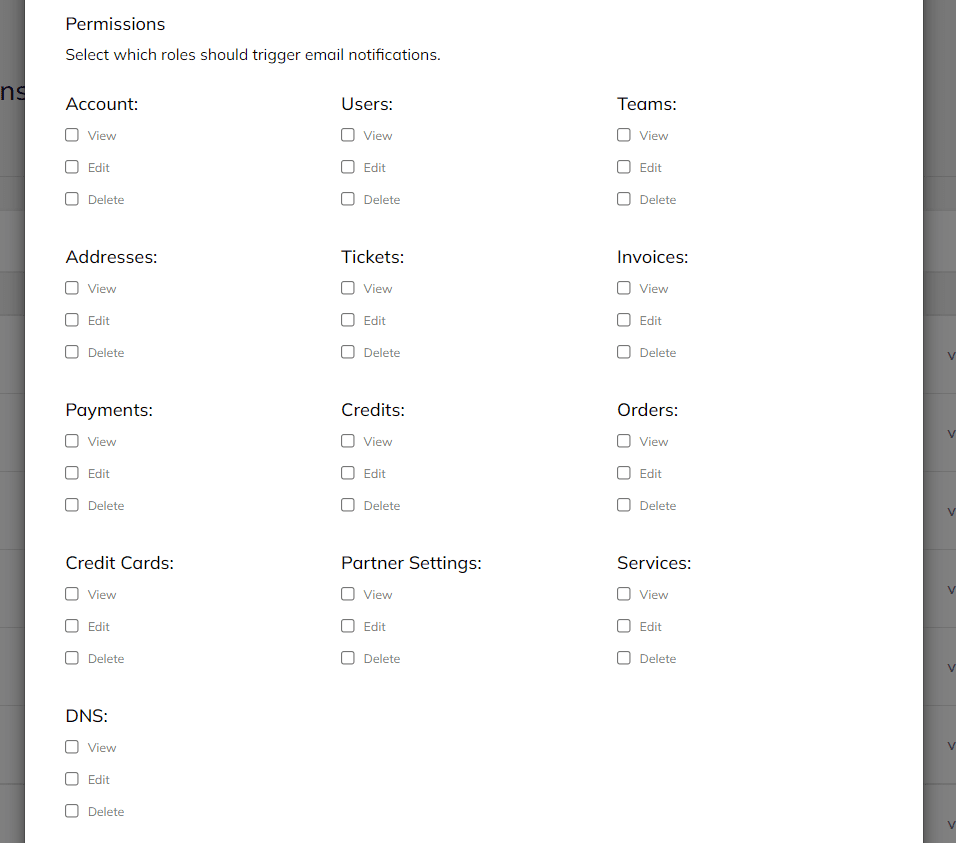
And, of course, you’re getting the solid combination of a control panel for your own hosting and backend management as well as a client-facing portal.
In your control panel, you can manage everything you need to, including clients and billing.
If you click on the Plan link in the left-hand sidebar menu, you can see an overview of your hosting plans, the number of sites on each plan, which app each plan is using, and more.

From this screen, you can add a new site, change the name of any of your sites, add a staging environment, or add a development environment.
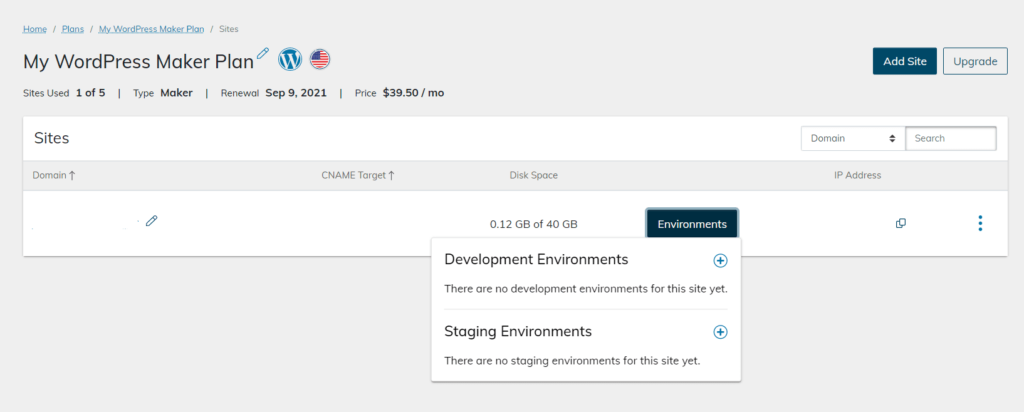
By clicking the three dots on the right of any site listed there, you can drill deeper into that site alone. There, you’ll find details on disk space usage, the site’s domain and CDN, and more.
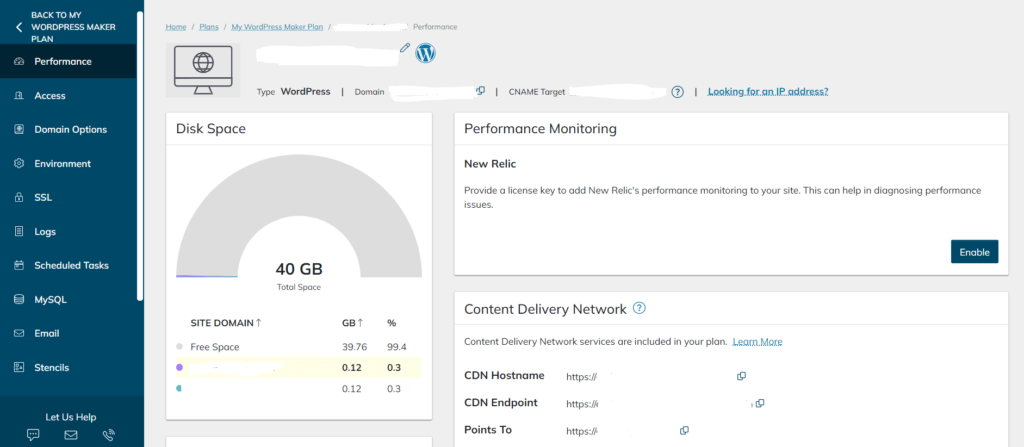
Clients get a clean, convenient portal that delivers the information and access they need, including their active support tickets, any outstanding invoices, sites they have created, and more.
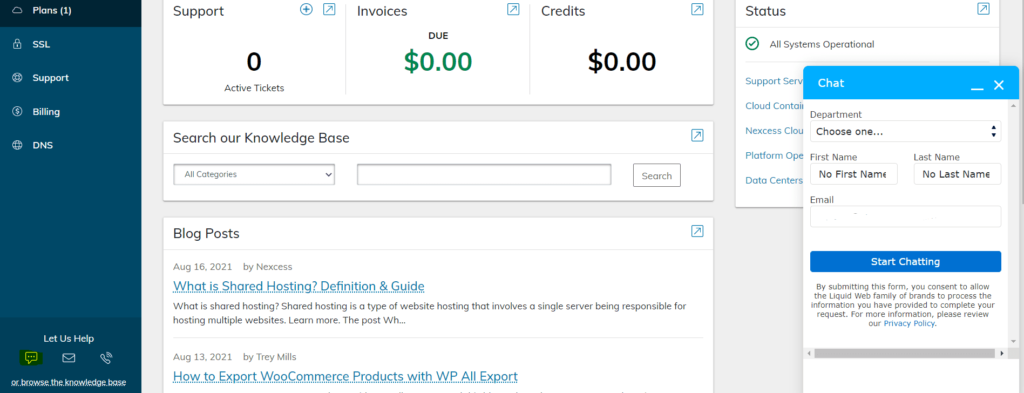
We love that Nexcess bakes a lot of managed hosting features and benefits into their agency hosting. Caching integration, core and plugin updates, daily backups, proactive security monitoring, and unlimited site migrations are all handled for you by the pros at Nexcess.
Speaking of those capable professionals, you also get the level of customer support you’d expect from this premium grade of web hosting. Reach out and get help for your hosting plan or your clients’ sites and applications 24/7, year-round via phone, live chat, or ticket submission.
If delivering quality is more important to your client base than affordability, or if you just want to offer your clientele the best possible hosting experience, no other provider on our list can match Nexcess.
Methodology for Choosing the Best Reseller Hosting Plans
In this section, we’ll give you a breakdown of the three key factors we used to assess the reseller hosting providers that made this list.
There’s a lot more to reseller hosting than some other categories of web hosting. Yes, you want solid performance (which is still a big factor in our research and assessment process) and quality customer support.
But some aspects take on deeper meaning, such as what constitutes a good price when you need to be mindful of how much you’ll charge clients to keep your margins healthy.
And feature sets take on new importance in this category, too. Beyond basics like SSL certificates, content delivery networks, and easy WordPress installation, you want to pay attention to useful tools that help you manage clients and boost their satisfaction.
Without further ado, lets get into the three main criteria we identified that are unique reseller hosting compared.
Competitive Pricing, But Room to Grow
Pricing is one of the biggest considerations in this category for a few reasons.
There’s a wide range of monthly rates among just the providers we included on this list. Though, after promotional pricing ends, renewal rates are clustered around the same few price points. For example, most entry-level reseller hosting plans renew at around $35 per month.
But the key here is how pricing impacts your profitability as a hosting reseller.
That goes beyond just the dollar amount of any provider’s plan. You’ll need to weigh the resource allocations against the price you’ll pay and figure out how many sites could reasonably be hosted without dragging down performance.
For example, if you have a plan that gives you 60 GB of storage and unlimited bandwidth for $19.99 per month, six clients could get an ample 10 GB of disk space each. You’d only have to charge them $3.34 per month to break even.
Compare that to Bluehost’s entry-level shared hosting plan—10 GB for a promo rate of $2.95 per month before it rises to $10.99 per month on renewal—and you can start to see the potential for offering competitive hosting rates while padding your revenue.
It’s all about this delicate balance of getting adequate shared resources on a plan that won’t cost you so much that you’ll have to overcharge your clients just to make any money.
And that balancing act relates directly to the next key criterion.
Features That Keep Customers Happy
As a reseller of web hosting and associated products like domains and email accounts, it’s crucial to find the right feature set in a reseller plan—both in terms of benefits you can extend to your customers and tools you can use for easy client, site, and hosting management.
While there’s a lot of overlap between providers in this regard, not everyone offers every key feature freely on every plan.
Let’s start with the management side of things.
A non-negotiable inclusion is some sort of control panel. You’ll often see WHM and cPanel offered, with the former (usually in the form of WHMCS) allowing you to manage clients and their plans, invoices, and support requests. You’ll usually give cPanel licenses to each client you host, so they can access the settings you let them control.
With these tools, an important factor is the ability to white-label the interface and client-facing portal. You likely don’t want your customers getting confused by seeing your hosting provider’s branding when they expect to be dealing with your web hosting.
Three of the hosts on our list come with cPanel licenses that offer a fully customizable interface. Two hosts use custom control panels and offer no customization.
On your end, you’re likely going to want WHMCS to automate some things for you, like the delivery of invoices and payment processing. However, if you’re a designer, web developer, or service provider offering hosting with your other services, automated billing software isn’t as important. You can run your entire business without it since you will most likely have another billing process for other client work.
One provider above is unique because it offers two options for billing and client management: WHMCS or Blesta.
There are two big elements here that serve as true differentiators.
For the agency side of things, domain name reselling is a huge bonus. Not only does it make it easier to secure domains for clients who host their sites on your platform, but you can also use it to increase revenue per client and your overall sales.
Two providers above don’t offer this option at all. Two others do, in the form of access to Enom, while a third really rises above the pack by adding access to another domain marketplace, ResellerClub.
For some of you, you may find reselling domains becomes a more profitable and prominent part of your service offerings than hosting.
On the other end, clients expect some important benefits if they’re going to choose your resold hosting over going directly to a primary hosting provider.
The big one here is automated site data backups. If anything should go wrong, you should have stored several days of previous site data and allow clients to access and restore those when needed.
Perhaps surprisingly, two of the providers above don’t include automated backups for free (one offers it as a paid add-on to your hosting plan). However, you can create manual backups on every platform.
You’ll want to judge the quality of this backup automation for yourself. Some providers only keep backups for a week or so, while others keep a rolling 30-day history of every site.
Another key feature is the ability to stage websites before publishing and bring clients and other third-parties (like contractors, partners, and external stakeholders) into your hosting platform. This becomes crucial for agencies who offer web hosting as just one part of a larger suite of services.
Beyond that, look for extra benefits from providers that you can in turn extend to your own customers. Managed hosting features, like proactive security monitoring, autoscaling, and optimized servers can help you guarantee better performance or stability with confidence.
That can be a big factor in supporting the final criterion to consider.
Quality Performance You Can Promise to Your Clients
Any time your client’s site goes down, they’ll come to you for answers.
Chances are they will be unhappy about it, since every second of downtime or any extended period of slow load times could mean they’re losing out on revenue and opportunities.
The more demanding or robust your client sites are, the more you’ll need to consider hosting performance when deciding on a reseller hosting provider.
Uptime and speed are the two factors here. Since most reseller hosting is done on shared servers, there’s going to be some volatility. And you shouldn’t expect VPS or cloud-grade performance unless your provider is offering those kinds of data centers on their reseller plans.
Sometimes, though, you’ll get a pleasant surprise. The cheapest reseller hosting provider above also delivers performance way above what you’d expect from shared hosting. But it can be hard to predict whether that will maintain when you’re hosting 10 or more clients instead of just one or two.
So, if clients only need to host simple sites, landing or event pages, and the like, you can probably get away with opting for a more affordable hosting option. You can pass the savings onto your clients.
But, if they’re running online stores, media-heavy sites, or complex web applications, you’re going to want to pay more for the performance they’ll require.
Opting for powerful or more specialized reseller hosting providers will keep them satisfied. And, because some providers at this level let you host unlimited websites on a plan with easy resource scaling, you may not actually have to charge an arm and a leg to make a bit of money.
A2 Hosting
Best for Most
One of the most well-rounded reseller providers out there, A2 Hosting delivers the features that matter and reliable hosting performance at a good price. Plus, your reseller business will be backed by A2's rock-solid support.
Summary
When it comes to reselling hosting (and other services), you have a few quality options to choose from.
For most users, A2 Hosting provides the feature set, performance, and affordability to start effectively reselling hosting. If you’re adding hosting to a package of other services you offer, like building sites for clients or hosting web-based applications, look to more specialized options like SiteGround or Nexcess.
However, every business is unique, so use our reviews and the methodology section above to help guide you in your purchasing decision. That way, you’ll confidently find the best reseller hosting plan that fits your needs and budget.











